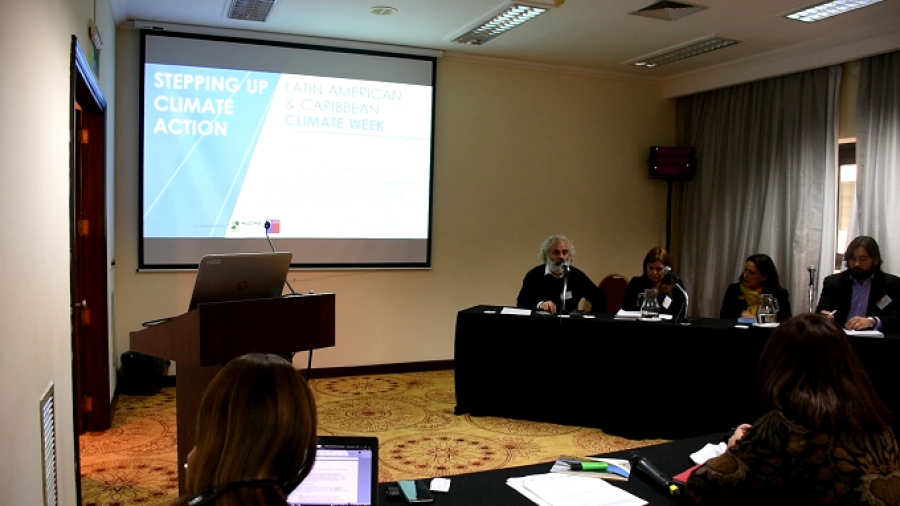Executive Director of SARAS presents results from LatinoAdapta during the Climate Week in Montevideo

From August 20 to 23 the Latin America & Caribbean Climate Week 2018 took place in Montevideo, Uruguay. This event tried to advance climate action at a regional level with the goal of supporting the “implementation of countries’ Nationally Determined Contributions (NDCs) under the Paris Agreement and climate action to deliver on the UN Sustainable Development Goals.”
SARAS Institute, together with the Regional Centre for Climate Change and Decision Making, participated in the event presenting results from “LatinoAdapta”, a project that seeks to “strengthen Latin American national governments’ capabilities in decision-making and the implementation of climate-related policies based on scientific evidence”. To the event, SARAS Institute was represented by Néstor Mazzeo (Executive Director), Micaela Trimble (Research and Cooperation Coordinator) and Paula Bianchi (Head of Communications).




On Monday 20, Mazzeo took part in the panel “Adaptation planning for vulnerable groups, communities and ecosystems” –Regional Technical Experts Meeting on Adaptation. During this session, and through regional, national and specific local examples, different experiences, knowledge and opportunities were explored towards the implementation of adaptation measures and the development of resilience in Latin America and the Caribbean. He specifically presented transversal results in relation to the main knowledge gaps that prevent the implementation of adaptation measures to climate change in the six countries that are part of LatinoAdapta’s study: Argentina, Brazil, Chile, Costa Rica, Paraguay and Uruguay.
Mazzeo pointed out that within the countries that are the focus of this study, it is possible to observe a change with respect to the implementation of adaptation measures beyond the mitigation measures that the different countries have been enforcing. He stated that this is due to a change in the institutional arrangements found in those countries, which seek to overcome the fragmentation of analysis and decision-making. He also pointed that these countries evidence an institutional effort in the research for integrating information and knowledge in climate issues. Each country presents a different and specific arrangement but in all cases work is being done to gather all attributes and indicators that relate directly or indirectly with the monitoring and tracing of adaptation measures.
In relation to the obstacles, he stressed that the main challenges refer to the evaluation of vulnerability and resilience components, especially in relation to impacts. “For all these cases and in the short term, the question is how to obtain robust monitoring and tracing systems related to adaptation capacity”, Mazzeo stated.
The preliminary project results reveal that large inequalities exist in terms of information and progress with respect to how to incorporate information into sectorial levels and between countries. The articulation between government levels is key when trying to incorporate the different strategies at territorial level. Furthermore, Mazzeo referred to the difficulty that exists when trying to obtain more co-production spaces in Science and Politics. Although some experiences do exist, there are no cases in which this is institutionalized except in the case of Costa Rica. The translation of scientific knowledge, evaluation logics and the capacity to respond to social demands are still limiting these multi-actor dialogues.
Finally, he highlighted the limitations in relation to the evaluation of public policies related to adaptation measures, which is generally acknowledged as one of the weaknesses that prevent us from learning about the impact of their application in different countries.
The different sessions within this panel were joined by researchers associated to the Regional Centre for Climate Change and Decision Making, members of the research team for LatinoAdapta: Eduardo Bustos (Communication and Transfer Coordinator at the Global Change Center, Pontifical Catholic University of Chile), Jordan Harris (National Director of Adapt Chile – Climate Change and Resilience) and Enrique Maurtua Konstantinidis (Regional Coordinator for LatinoAdapta).




